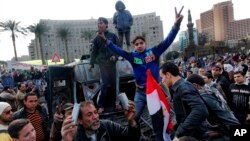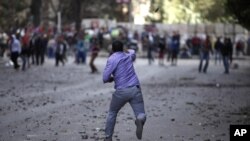The head of Egypt's military has warned that the country's political crisis could lead to the "collapse of the state."
Abdel-Fattah el-Sissi, who also serves as defense minister, made the comments Tuesday in a speech to military academy cadets.
Sissi's warning followed a night of protests with hundreds of anti-government demonstrators packing the streets in Egyptian cities, ignoring state-of-emergency rules and a nighttime curfew meant to suppress riots.
Political analyst Rania el-Malki told VOA that the Egyptian military is trying to pacify the protesters.
"I think it's just a way of telling the people that we need to have some kind of calm, we need to maintain some kind of calm," she said. "To perhaps convince understandably angry young people that there has to be a peaceful way of expressing their anger or their frustration with the current administration, that the use of violence is going to lead us nowhere, and that we are all in the same boat."
Video footage of Egyptian protests
Egyptians defying the curfew gathered in Port Said, Ismailiya and Suez City after the measure took effect late Monday. VOA Cairo correspondent Elizabeth Arrott said the three flashpoint cities have strategic importance for the Egyptian government.
"These cities along the Suez canal are obviously a huge money earner for Egypt," Arrott said. "So they do not want to risk any chance of something happening there that would interrupt that flow of revenue or scare away investors even further or continue the unrest [that has been] keeping tourists away."
President Mohamed Morsi decreed the emergency regulations on Sunday after chairing a meeting of the National Defense Council, which includes civilian Cabinet ministers and senior military officers.
Morsi's Cabinet also approved a draft law allowing him to deploy the army to assist police in providing security, including arresting civilians.
In a gesture to his opponents, the president called for a national dialogue and invited opposition groups and politicians to join him for talks on Monday.
That effort failed, however, as the main opposition National Salvation Front and other opposition groups refused to take part in any talks under the current conditions.
Opposition balks
Former presidential candidate and Arab League head Amr Moussa told journalists that the opposition still seeks dialogue, even though it stayed away from Monday's meeting.
He said the opposition remains ready for dialogue and that dialogue need not lead to a predetermined result, and it is not true that the opposition is afraid of the possible results.
In contrast, Muslim Brotherhood political figure Pakinam El-Sharqawi told a press conference at the presidential palace Tuesday that the government is trying to facilitate an entente but is being frustrated by certain opposition leaders.
She said the ball is in the court of the opposition and that those leaders who attended the dialogue session do in fact represent many sectors of Egyptian society. She accused several key opposition leaders of changing their demands to avoid dialogue.
January 25: Violence erupts as protesters mark second anniversary of uprising that ousted Hosni Mubarak
January 26: Armed forces deploy in Suez, riots erupt in Port Said after verdict issued in football case
January 27: President Mohamed Morsi declares 30-day state of emergency in three provinces
January 28: Protesters pack streets, defying emergency rules and curfews
January 29: Head of military warns the political crisis could lead to the "collapse of the state"
Arrott said the opposition coalition is facing growing criticism for its decisions.
"People are increasingly calling them out of touch," she said. "They said from the [beginning] they would not negotiate with the government without preconditions. One analyst I spoke to said [Egyptians] want someone to negotiate. By their refusing, it only seems to polarize the situation and create this stalemate where nothing is going forward. So, there is frustration all around."
Military role
Analyst Malki said the relationship between the Islamist president and relatively secular army officers has become more cohesive.
"I think Morsi in his own way somehow managed to - I don't want to say co-opt - but I think he has managed to kind of bridge that gap that we all thought would continue to be there," she said. "It seems to be they are doing really well communicating."
Veteran Egyptian editor and publisher Hisham Qassem told VOA that he does not believe the current unrest will lead to a civil war, but that he thinks the Egyptian army will start taking a more prominent role in the crisis to rein in the situation.
“When it comes to deploying the military, I have no doubt the military will deploy if necessary," Qassem said. "But it cannot be read as a coup. I have no doubts that if there is turbulence, and it looks very likely that that will happen, that they will deploy, stabilize the country and do a repetition of the scenario we had two years ago.”
Almost 50 people have died since Thursday, when violence broke out during rallies marking the second anniversary of the uprising against former Egyptian leader Hosni Mubarak.
Port Said has been the worst-hit area, with at least 37 people killed. Violence in the city escalated Saturday after a court sentenced 21 people to death for their involvement in a deadly football riot there last year.
Edward Yeranian contributed to this report from Cairo.
Abdel-Fattah el-Sissi, who also serves as defense minister, made the comments Tuesday in a speech to military academy cadets.
Sissi's warning followed a night of protests with hundreds of anti-government demonstrators packing the streets in Egyptian cities, ignoring state-of-emergency rules and a nighttime curfew meant to suppress riots.
Political analyst Rania el-Malki told VOA that the Egyptian military is trying to pacify the protesters.
"I think it's just a way of telling the people that we need to have some kind of calm, we need to maintain some kind of calm," she said. "To perhaps convince understandably angry young people that there has to be a peaceful way of expressing their anger or their frustration with the current administration, that the use of violence is going to lead us nowhere, and that we are all in the same boat."
Video footage of Egyptian protests
Egyptians defying the curfew gathered in Port Said, Ismailiya and Suez City after the measure took effect late Monday. VOA Cairo correspondent Elizabeth Arrott said the three flashpoint cities have strategic importance for the Egyptian government.
"These cities along the Suez canal are obviously a huge money earner for Egypt," Arrott said. "So they do not want to risk any chance of something happening there that would interrupt that flow of revenue or scare away investors even further or continue the unrest [that has been] keeping tourists away."
President Mohamed Morsi decreed the emergency regulations on Sunday after chairing a meeting of the National Defense Council, which includes civilian Cabinet ministers and senior military officers.
Morsi's Cabinet also approved a draft law allowing him to deploy the army to assist police in providing security, including arresting civilians.
In a gesture to his opponents, the president called for a national dialogue and invited opposition groups and politicians to join him for talks on Monday.
That effort failed, however, as the main opposition National Salvation Front and other opposition groups refused to take part in any talks under the current conditions.
Opposition balks
Former presidential candidate and Arab League head Amr Moussa told journalists that the opposition still seeks dialogue, even though it stayed away from Monday's meeting.
He said the opposition remains ready for dialogue and that dialogue need not lead to a predetermined result, and it is not true that the opposition is afraid of the possible results.
In contrast, Muslim Brotherhood political figure Pakinam El-Sharqawi told a press conference at the presidential palace Tuesday that the government is trying to facilitate an entente but is being frustrated by certain opposition leaders.
She said the ball is in the court of the opposition and that those leaders who attended the dialogue session do in fact represent many sectors of Egyptian society. She accused several key opposition leaders of changing their demands to avoid dialogue.
Latest Developments in Egypt
Latest Developments in EgyptJanuary 25: Violence erupts as protesters mark second anniversary of uprising that ousted Hosni Mubarak
January 26: Armed forces deploy in Suez, riots erupt in Port Said after verdict issued in football case
January 27: President Mohamed Morsi declares 30-day state of emergency in three provinces
January 28: Protesters pack streets, defying emergency rules and curfews
January 29: Head of military warns the political crisis could lead to the "collapse of the state"
"People are increasingly calling them out of touch," she said. "They said from the [beginning] they would not negotiate with the government without preconditions. One analyst I spoke to said [Egyptians] want someone to negotiate. By their refusing, it only seems to polarize the situation and create this stalemate where nothing is going forward. So, there is frustration all around."
Military role
Analyst Malki said the relationship between the Islamist president and relatively secular army officers has become more cohesive.
"I think Morsi in his own way somehow managed to - I don't want to say co-opt - but I think he has managed to kind of bridge that gap that we all thought would continue to be there," she said. "It seems to be they are doing really well communicating."
Veteran Egyptian editor and publisher Hisham Qassem told VOA that he does not believe the current unrest will lead to a civil war, but that he thinks the Egyptian army will start taking a more prominent role in the crisis to rein in the situation.
“When it comes to deploying the military, I have no doubt the military will deploy if necessary," Qassem said. "But it cannot be read as a coup. I have no doubts that if there is turbulence, and it looks very likely that that will happen, that they will deploy, stabilize the country and do a repetition of the scenario we had two years ago.”
Almost 50 people have died since Thursday, when violence broke out during rallies marking the second anniversary of the uprising against former Egyptian leader Hosni Mubarak.
Port Said has been the worst-hit area, with at least 37 people killed. Violence in the city escalated Saturday after a court sentenced 21 people to death for their involvement in a deadly football riot there last year.
Edward Yeranian contributed to this report from Cairo.






